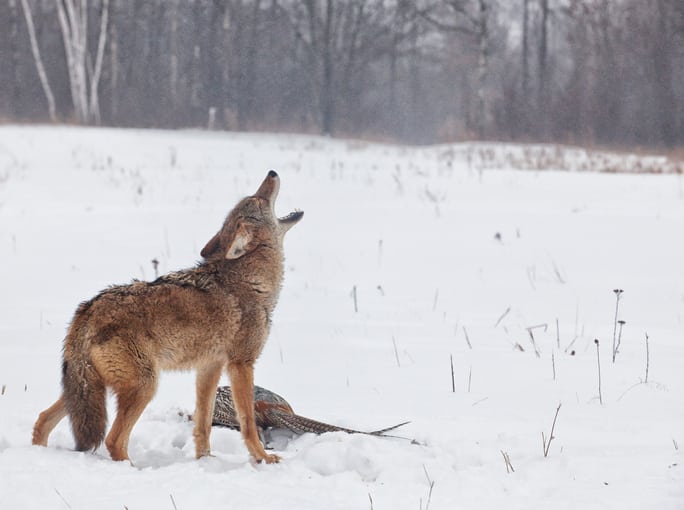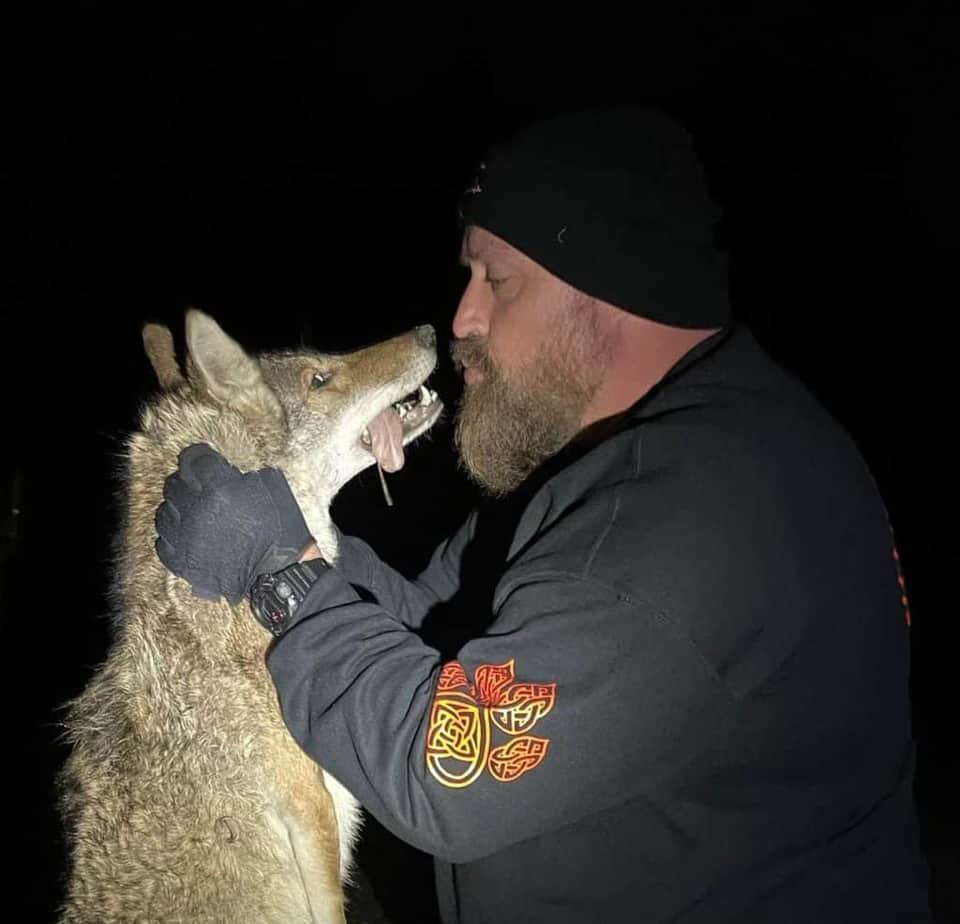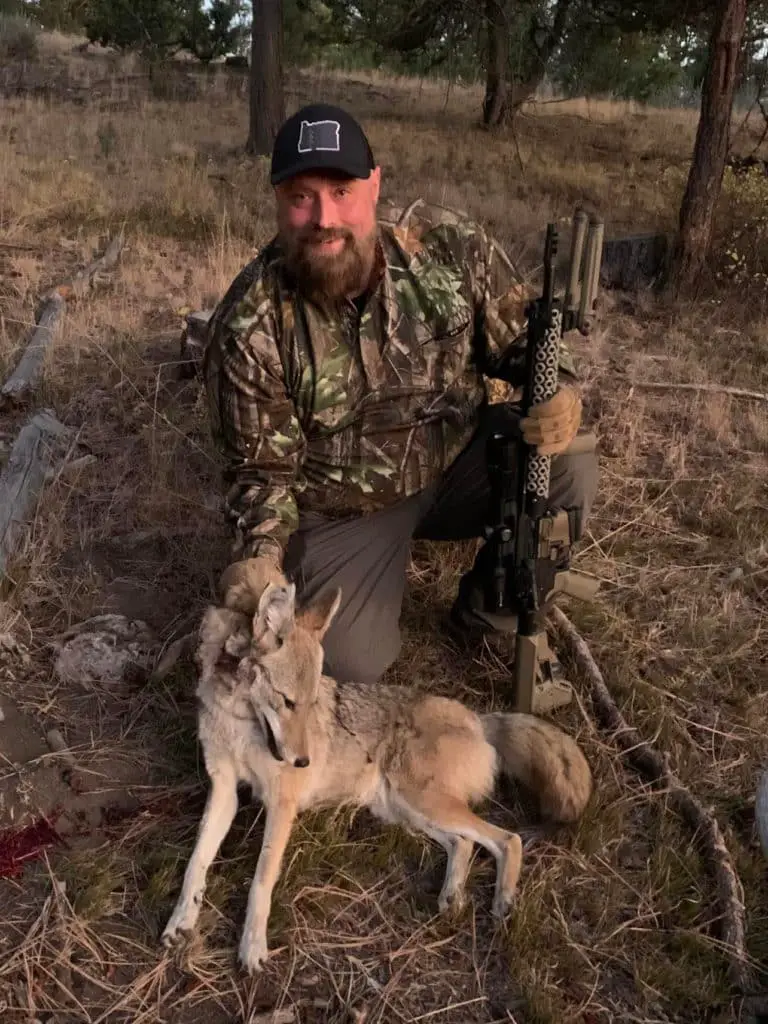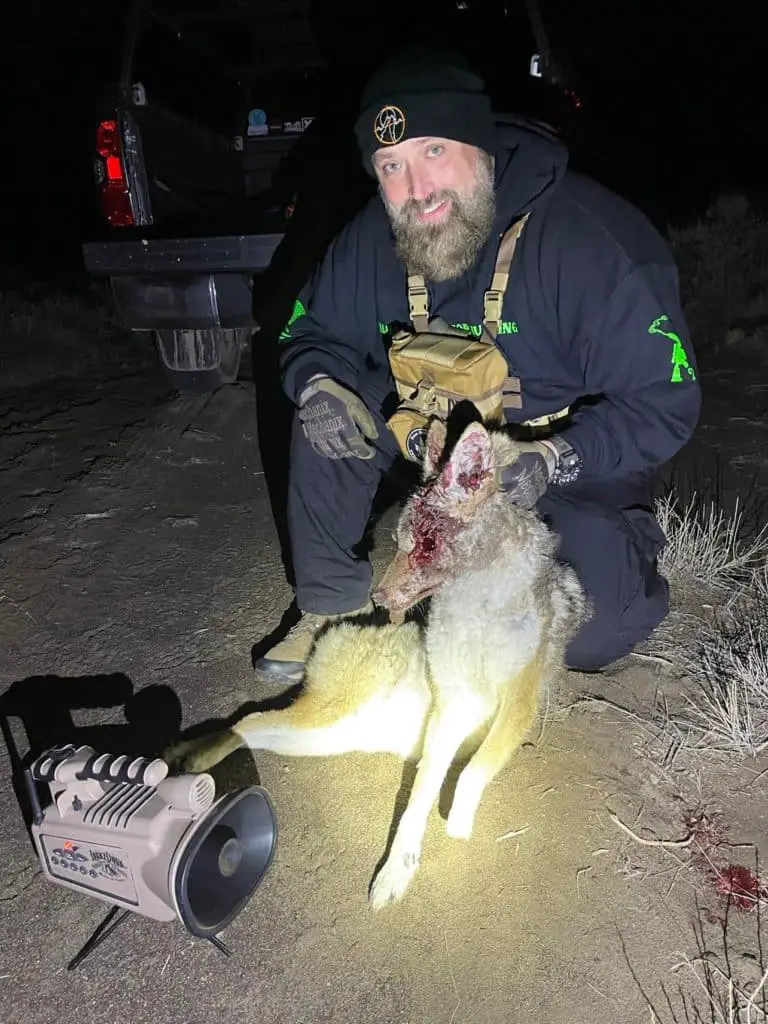Getting permission to hunt private land is as vital to predator hunters as to deer hunters. Unfortunately, while private land may contain a wealth of low-pressure hunting areas, the idea of appearing hat in hand at a stranger’s door can be intimidating.
Well, I am a property owner, and every year I get a few strangers knocking on my door. Unfortunately, almost every single one of them makes a fatal mistake. Here are eight ways to avoid the same error when asking permission to hunt my land. Use them correctly, and you’ll be able to hunt wolves, coyotes, and foxes during fur season and maybe even bucks during deer season.
1. Scout before asking permission to hunt private land.
Every hunter who knocks on my door already knows why they want access to my land (there are no wolves where I live). They’ve done their scouting homework and realize the miles of dense woods that surround my large open field don’t contain any rabbits for coyotes or browse for deer. So they know the deer and the coyotes must frequent my lot for these food items.
What they haven’t scouted out are me and my field. How do I know this? Well, first off, who thinks a guy who decorates his shed with antlers is interested in having strangers deer hunt his property?
Yeah, it’s that obvious they have no clue where they are. But, folks, we have this thing predator and deer hunters can use now; it’s called “the internet.” So, at the very least, you won’t have to witness the expression on my face when I decline the invite to have you protect my animals from coyotes—and then hand you a copy of one of my predator hunting books.
Your hunting app will clearly show you my property lines and give you my contact information. So before you knock on my door, use this information to find out everything you can about me, my land, and what I am using it for.

2. Be respectful when asking for permission to hunt private land.
Respect goes beyond the “sirs and ma’am’s.” Your practiced speech and friendly, polite tone are the second impressions you make on a private landowner. The first one, and the most critical one, is made on your approach to the door.
What does your vehicle look like? How you care for your stuff will tell me everything about how you care for mine.
Come alone, unarmed, and during the day. If you come with a buddy or two, I might think you are trying to intimidate me. If you come armed, you are trying to intimidate me. If you come in the dark, you have intimidated me. If you have done all three? The sheriff, state police, and game warden are already on their way, my dogs have surrounded your vehicle, and everyone in the house has switched off all the lights and fired up their NVG’s and thermal scopes.
Expect to get a negative response the first time you ask. You should understand one thing about a private landowner—they don’t want to get sued. If they let you hunt, they own every shot you take. If someone gets hurt, that person will sue them. Blame society, blame the lawyers but don’t blame the landowners who say no the first time. Just expect a no and begin working on how you’ll change the owner’s mind.
If you make that first approach expecting a refusal, your approach will be different. You won’t try to hard sell me or come off as desperate. But, on the other hand, if you push too hard or appear a bit reckless, I’ll never change my mind about you.

3. Expect to be scouted yourself when seeking hunting permission.
I’m going to google you and check your references.
If there’s a video of you taking coyotes or foxes, are all of your videos of DRT (dead right there) shots? Are wounded animals quickly dispatched with follow-up shots? Such videos tell me you have a level of skill with your weapons. That will help ease my concerns.
Are you using ARs or bolt-operated rifles? Not every farmer or rancher is a fan of ARs. You and I may enjoy them and see their need for predator hunting but to a landowner? To a landowner, an AR means more rounds being fired and perhaps at moving targets and with less care. So when you ask for permission to hunt private property, make sure your visual aids (YouTube videos, biz cards, and Facebook pages) feature rifles that say, well-aimed shots.”
After-action videos should show the carcass being correctly handled. Don’t let your dogs touch dead coyotes, and never let them finish off or savage wounded predators. Now calm down, Francis! I’m not attacking the practice of using dogs to hunt; I’m just saying to be mindful of your audience. A surgeon doesn’t put ads on tv that show him dumping human body parts in the trash. Okay? A quick hand across the fur, a suggested use for the pelt, and a comment like this will help the deer survive next year, or this chicken killer won’t be harming any local farmers anymore” sends a better message.
4. Ask for permission to hunt well before the season begins.
Asking before the deer season permission to hunt private land early.
Sounds obvious, right? You’d be surprised how man folks show up the day before or at the most a week before deer season. Probably not the romantic type either; these are the guys who buy anniversary flowers at the drug store on the way home from work.
If you don’t show up well before the season, you look and sound more desperate. So now you’re an anxious stranger knocking at my door. Yeah, no.
Before the season, you should be making some effort to meet me and establish a relationship before asking for a favor. If there are eggs or vegetables for sale, buy some. The next time, leave a note asking if you can arrange for a larger order to pick up and pay for in person. Now, please don’t get all stalker on me. It’s okay if I bump into you while putting out the morning eggs, but just do it once and say hello.
If you own your farmland, consider asking if you can buy some chicks or ducklings from them. I’ve done this to other farmers, and though I never intend to ask to hunt their land, they are always willing to sell livestock.
Skip the letter writing, ask for permission to hunt in person.
One quick note on using letters to get permission to hunt private land. I’ve seen good-intentioned articles suggest writing letters and asking for permission to hunt. My reaction has always been to study handwritten envelopes carefully, note the local addresses, and then dump them straight into the garbage. The few I’ve opened have never offered me anything. Instead, they want me to use my tractor to plow their driveways or want me to adopt the chicks they bought for Easter. Stick to in-person requests.
If you wait too long, even if we are friends, someone may have already asked for and received permission to hunt. So take my no in such circumstances kindly and recognize that too many strangers on a piece of land make it as pressured as a 10-acre state park.

5. Sweeten the pot.
If you want to up your game, make your pitch about someone else, at least the first time.
Ask me if you can mentor your child during their first bow hunting season. In my state, that means no adults with firearms and a youngster who has a solid chance to take their first deer while being carefully watched over.
Offer a gift of a tanned pelt or prepared game if you are successful. Venison snack sticks are my weakness. Offer to bring a wounded vet or disabled person out for a predator hunt. Your sacrifice of time for the good of others will quickly win you a solo hunt on my land. This is the only time a three-person team would ever be allowed to hunt my land.
Bring along an insurance policy. Ask your agent how to purchase some insurance that protects you and me from any possible legal action down the road. I’ll check the policy, so make sure it’s real.
6. Be clear about what you are asking permission to do.
Please make sure we both know when you are on my land. Set a schedule and text me a few hours before you arrive.
Never bring a guest or a buddy unless I’ve met them. I want to know the names of everyone in your party, but the more you want to bring, the worse the odds. And your odds drop by 50% if you’re going to bring a friend. They fall to zero if your party numbers three or more.
If you are hunting coyotes, make sure the land owner knows you’ll be on his or her land at night and that they may hear some strange sounds/
Related: https://thepredatorhunter.com/the-absolute-best-hours-for-hunting-eastern-coyotes/
Related: https://thepredatorhunter.com/coyote-calling-sounds-your-successful-pals-keep-secret/
Ask to hunt predators first. For example, offer to remove the coyotes and foxes, killing my livestock after deer season. You can suggest hunting them before deer season, but make it clear you’ll stop early enough for the land to quieten back down for the deer to return. The following season, ask to include a doe hunt.
Predator hunters should be aware that not every farmer hates coyotes. Coyotes kill the deer that often go after certain crops. If you are unsure, stick to asking folks with chickens, ducks, and cattle. Most of them hate coyotes.
Show me you know where my landlines are. I don’t want my neighbor complaining about hunters from my land trespassing on theirs. A good app will also help you prove that you know where you can safely shoot.

7. Tricks to increase your odds of getting permission to hunt private land.
A few other tips will improve your odds of getting permission to hunt other people’s private land.
Get as far away from large populations as possible. I know folks with 50 acre lots that live five minutes from a major city. After the first deer season, the posted signs telling people there was no hunting allowed, period. If you ask too close to a big town or city, you’ll be the 38th stranger to interrupt lunch.
Avoid politics. Please don’t talk about it. Don’t have bumper stickers about it on your vehicle. There’s no way to judge a landowner’s political bent. Any talk or overt signs over your own opinion can, at best, reduce your odds by 50%.
Dress like you are going to church. Skip the camo and aim for a business casual look.
Get some predator removal service cards made up and hand them out. Make sure your cards offer free coyote and fox removal explicitly. You want landowners to know you kill property destroying animals, but you don’t get squirrels out of attics or takedown hornet’s nests.
8. After you have hunting permission, show some gratitude.
Check-in with the landowner as often as possible. Report successful harvests. Repeat your thanks. Bring gifts. Report unusual activity you notice. For example, spend an hour covering firewood, cleaning snow off the family vehicle, or ask if you can help with a quick outdoor chore.
Drop a holiday card in the mailbox at the end of your season and wish them a happy new year.
Make sure you keep the gates closed, clean up any litter you find, and leave no evidence (gut piles, spent shells) you were ever there.
Carry some state permission forms with you. Most states have a simple consent form that outlines the rules you will follow while hunting.
How Valhalla Predator Hunting gets hunting permission.
Shawn Enfield of https://valhallapredatorhunting.onuniverse.com/ provided us with a few tips on how he obtains new clients for his predator removal service:
I operate out of Sandy, Oregon, and I work the entire state of Oregon. So I travel all over the state. I have 12 local properties, three other permanent ranches where I work, and one that calls for my services when needed.
My tips for gaining access to private land? Word of mouth has been pivotal to getting permission to access more land and gain more clients. When I go door to door asking for permission to hunt, I use it as a solid opportunity to sell my services and company.
Invest some time explaining why you seek permission to hunt private land.
I take it speaking with landowners seriously, listening to the problems (if any) the landowner has. I act professionally, introduce myself, and hand them a business card. I inform them of what I do and ask them if they have any predation issues on their land.
I’ll get a thumbs up and a green light to drop any predators on the land most of the time. The best advice I could give is to act professional, polite, and respectful. You are asking them for a favor at first, and if you take predators off their land, you’ve returned the favor.
Make sure you know what the land owners need.
Once I get permission, I get a tour of their land. I find out where coyotes are seen or heard and where most of their problems have been on the land.
How long before the season do I ask for permission? Well, most folks have an issue here or there with predation. They might have coyotes harassing their horses or sheep and want them gone. They may have a significant loss of chickens as well. But my bread and butter work is working calving season! That’s when a lot of ranchers want predators gone! In one year, losing 3-5 calves is a significant hit.
I try to meet with cattle farmers about 2-3 months before calving starts. Sure, ranchers have different calving seasons based on how they operate, but most in my home state want auction-able cattle by fall.
Yes, we use social media, and it has been a great way to promote my company! I use Facebook and Instagram, plus I have my website. I made sure to put all of that info on my business cards so that potential clients could check my business and myself out further. Almost everyone has social media, and if they don’t have social media, they at least have internet. Many landowners want to verify who you are and precisely what you do, and social media has helped tremendously with that.
The only way to get permission to hunt private land.
Knock on as many doors as you can, appear presentable, and act respectfully.
The equation for predator hunting success is simple: the more land you have access to, the more success you will have.

